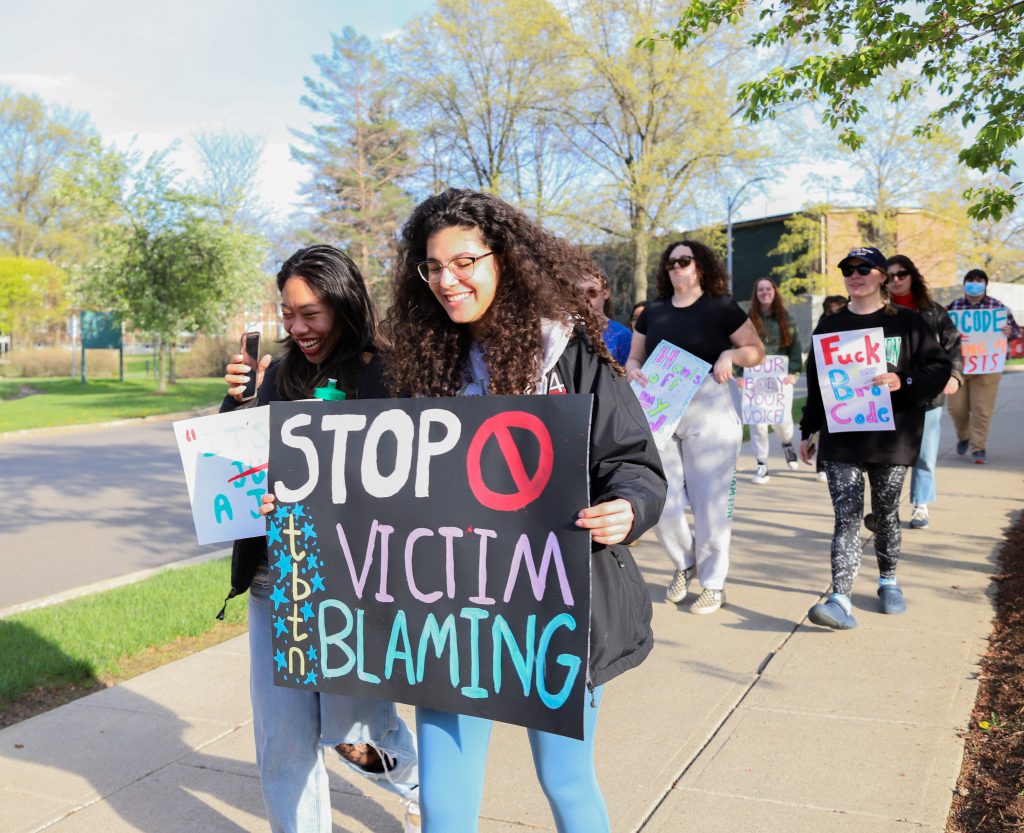On Thursday, Binghamton University students joined the Feminist Collective for their annual “Take Back the Night” rally in protest of sexual and interpersonal violence.
The rally, which took place at the Peace Quad, was organized by the BU Feminist Collective — a student organization established with the intent of advocating for intersectional feminism and opposing the disrespect and disenfranchisement of women and other marginalized groups — and has historically been impactful for survivors of sexual and interpersonal violence, according to an Instagram post from the organization. The event marked the conclusion of Take Back the Night (TBTN) week, which included the “Line the Spine & Chalking Event,” a survivor-centered discussion and poster-making leading up to the rally.
Alexandra Miranda, the senior advisor for the Feminist Collective and a senior double-majoring in human development and sociology, described some of the key steps and considerations taken when organizing the event.
“Some of our main priorities when organizing our TBTN rally was ensuring we are creating safe spaces to uplift, support and advocate for the agency and voices of survivors of violence,” Miranda wrote in an email. “Through every event we organize leading up to the annual rally, we work hard to develop new ideas for events and programming to support survivors and center their experiences since they are often silenced and neglected by larger institutions of power, such as BU.”
Students were handed signs to hold up during the rally with phrases like “no means no” and “believe survivors,” while the organization’s E-Board gave a trigger warning given the event’s purpose. Attention was drawn to the marshals at the event, who were assigned to lead participants to a safe space should they feel uncomfortable. The E-Board then gave a brief history of the event, which has happened nationwide since 1972, when a group of women at the University of Southern Florida marched through their campus demanding resources and safety for women.
According to Miranda, the Feminist Collective has hosted the event annually with the goal of ensuring that survivors’ voices are uplifted and that their experiences are centered.
“Oftentimes, survivors face marginalization and are encouraged to not speak about what has happened to them, let alone how they are doing emotionally, physically and mentally,” Miranda wrote. “TBTN is a radical call to action and a demand for survivors to be heard, to be supported and to reclaim their agency and bodily autonomy.”
After a series of speeches by organization leaders, Haley Murphy, the assistant director of education and training at the Crime Victims Assistance Center (CVAC), was invited to speak about resources for survivors of sexual and interpersonal crimes. At the conclusion of her speech, the rally around campus began with the E-Board leading the march.
Participants in the rally joined in a series of chants such as “claim our bodies, claim our rights. Take a stand, take back the night” as they walked around campus. Some students witnessing the rally showed their agreement by joining in from a distance or nodding in approval.
Iris DeFino, a rally participant and a sophomore majoring in political science, described her personal connection to the goals of the march.
“This event was pretty significant to me as a survivor of sexual assault and as a feminist,” Defino said, “I remember last year it was a very important healing experience for me, being empowered with other people who believed me and supported me. It was a collective effort to raise awareness and how to protest general rape culture and institutional negligence at the University. I think it’s just such an important event for people to come together and unite on this common cause.”
The event concluded with the rally’s return to the Peace Quad, where participants took a break before walking down to the University Union Undergrounds to engage in “survivors speak-out,” where survivors of sexual and interpersonal violence had a safe space to share their stories.
Miranda added that there was a significant lack of spaces dedicated to supporting survivors of sexual and interpersonal violence.
“There should be more spaces that prioritize survivors, since oftentimes the approach people have to instances of violence is to focus on the harm itself and the perpetrator, instead of the survivor,” Miranda wrote. “It is important to keep in mind that everyone’s story is unique, [and] survivors are not a homogenous group with all of the same needs. We have to listen, confront our own biases/misconceptions about sexual violence and demand change for survivors.”



